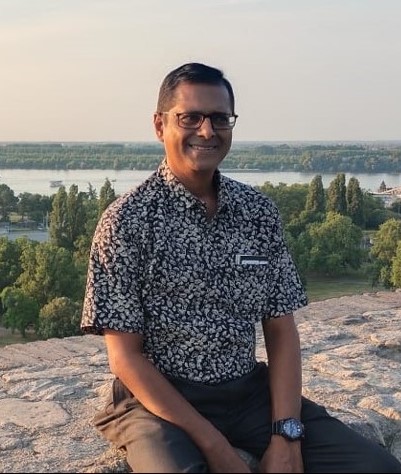Prof. Ranjan Dey is a Fellow of the Royal Society of Chemistry (FRSC), U.K. The designation FRSC is given to a small group of elected Fellows of the Society who have made outstanding contribution to Chemistry.
Last Year he gave an INVITED TALK (11/07/2023) at 38th International Conference on Solution Chemistry (38th ICSC-IUPAC), held at BELGRADE, SERBIA, 9TH -14TH JULY, 2023.
His research Scholar , Aditi Prabhune was awarded the BEST POSTER AWARD IN THE 38TH ICSC-IUPAC Conference.
He was invited to Deliver a Keynote in THERMAM 2019 on “Newer, simple and effective approaches for predicting viscosity of binary, ternary and multicomponent liquid mixtures” AT 6th International Conference : Thermophysical and Mechanical Properties OF Advanced Materials-THERMAM 2019 & 8TH ROSTOCKER International Conference, at Cesme, Izmir , TURKEY, 22ND – 24TH September, 2019. https://thermam.org/.
He was invited to attend the Meeting of the FARADAY COMMUNITY COUNCIL held in October 2023 in the Royal Society of Chemistry, Burlington House, London.
PROF. RANJAN DEY WAS BESTOWED THE TEACHING EXCELLENCE AWARD, BITS PILANI K K BIRLA GOA CAMPUS IN 2022.
HE IS A PART OF THE TEAM OF RESEARCHERS WHO HAVE BEEN RECENTLY AWARDED A SPARC PHASE 3 PROJECT WITH STELLENBOSCH UNIVERSITY, SOUTH AFRICA- APRIL 2024; 24 MONTHS : FUNDING INR 73,20,000/-.
He is an elected member of the Faraday Community Council for Physical Chemistry, U.K. and Statistical Mechanics and Thermodynamics Group(SMTG), RSC, U.K.
He was invited as an Academic Visitor to the Department of Chemistry, Cambridge University, U.K. and spent the summer of 2018 working under the mentorship of Prof. David Wales, a world renowned authority in the field of Potential Energy Landscapes, as a part of the University Immersion Programme of BITS Pilani University.
Prof. Ranjan Dey joined BITS Pilani in January 2006 as an Assistant Professor. He has more than 25 years of teaching experience having taught a number of discipline, interdisciplinary and multidisciplinary courses at BITS Pilani KK Birla Goa Campus along with holding several administrative positions like Associate Dean- Academics and Resource Planning (ARPD), Goa Campus, Convener- Departmental Committee of Academics (DCA), Convener- Student Faculty Council (SFC)-Dept. of Chemistry, Goa Campus, Member- NAAC Advisory Committee, Member- IQAC Committee, Convocation Core Committee, Hostel Warden ( 2007-2015), Faculty Coordinator- Mess Committee ( 2007-2016), Coordinator- Golden Jubilee Celebrations (GJC)- Goa Campus, etc .
Prof. Ranjan Dey, did his B.Sc., M.Sc. and Ph.D. from the University of Allahabad and taught for 7 years in the Department of Chemistry, University of Allahabad from 1999 to 2005
• He has given several Keynotes and Invited Lectures in International and National Conferences and Symposia including Germany, Turkey, Taiwan, U.K, and U.S.A.
• He was invited to National Taiwan University of Science and Technology (NTUST) , Taipei, Taiwan in 2016 as a Visiting Associate Professor to teach a Course to M. Tech. Chemical Engineering and Ph.D. students.
• The DEY BISWAS model developed for predicting viscosity of binary and higher order liquid mixtures is seen to be giving excellent agreement with experimental findings. It has been tested rigorously on more than 500 binary, more than 50 Ternary and higher order liquid mixtures.
• The model is found to be working very well in case of Ionic Liquid Mixtures and on Deep Eutectic Solvents.
• The group has developed some more predictive models which are working better than several well established models for predicting viscosity.
• He was invited to present his Research work in Heidelberg and Rostock in Germany, NTUST and CYCU in Taiwan, Turkey and in Boulder, Colorado, U.S.A.
• He also visited Nanyang Technical University (NTU) and National University of Singapore (NUS) in July 2016 to initiate international collaboration between the Universities and BITS Pilani K K Birla Goa Campus regarding student and faculty exchange for Internships, Ph.D. and joint research projects.
• He has also given several Popular Science Lectures at various Schools in Singapore, India and NASI Summer School, Allahabad, Prayagraj.
• He has been awarded OUTSTANDING REIVEWER AWARD from JOURNAL OF MOLECULAR LIQUIDS & INTERNATIONAL JOURNAL OF BILOGICAL MACROMOLECULES.
• He won the BEST TEACHER AWARD in Sept, 2022 at BITS Goa Campus.
• He is Editorial Board Member of Frontiers in Chemistry- Physical Chemistry Chemical Physics.
• He has published 80 papers in Peer Reviewed Journals.
• Reviewer of more than 10 International Journals of high impact factor.
• He has more than 1350 citations.
• Presently he with his collaborator is working to see how carcinogenic industrial solvents can be replaced by greener and sustainable alternatives.
• His field of Research Interest includes Thermophysical Properties of Liquids and Liquid Mixtures and Renewable, New and Non-Conventional Energy including the Water Energy Nexus.
• His paper along with his colleagues published on Anaerobic Digestion in Renewable Sustainable Energy Reviews in 2010 has more than 350 citations till date.
• He has published 2 Book Chapters in Books published by SPRINGER AND ELSEVIER.
• He is the EDITOR of a Recent Issue of Frontiers - SOLVATION EFFECTS OF ORGANIC REACTIONS IN IONIC LIQUIDS, DEEP EUTECTIC SOLVENTS AND CONVENTIONAL SOLVENTS. FEBRUARY 2023.
• https://www.frontiersin.org/articles/10.3389/fchem.2023.1159357
• Recently they have developed a Novel approach for Thermodynamic Property Estimation of Low to High Salinities Aqueous Sodium chloride solutions for Water Energy Nexus in Industrial & Engineering Chemistry Research, 59 (36), 16029-16042(2020).. (https://pubs.acs.org/doi/full/10.1021/acs.iecr.0c02575).
His current areas of Research include
- Thermodynamic and Transport Properties of Liquid Mixtures, Excess Thermodynamic Properties
- Prediction of Thermodynamic and Thermoacoustical properties.
- Renewable , New and Non Conventional Energy.
- WATER- ENERGY-NEXUS(WEN)















